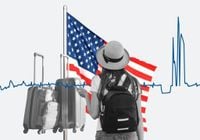Switzerland has no plans to increase digital security for diplomats visiting the United States, despite the European Union issuing burner phones to protect its personnel from potential snooping. This decision comes in the wake of a growing trade war initiated by former U.S. President Donald Trump, which has increasingly damaged trust between the U.S. and its Western partners.
The EU Commission has announced adjustments to its security recommendations for EU personnel traveling to the U.S., with disposable cell phones, commonly known as burner phones, being utilized to prevent unauthorized access to sensitive information. According to the Financial Times, such measures are now deemed necessary for travel to the U.S., similar to those for travel to countries like China or Ukraine.
However, the EU Commission clarified that no formal written instructions to adopt burner phones were issued. This lack of formal guidance highlights the growing mistrust between the U.S. and its formerly close political allies. The situation reflects a significant shift from a rules-based international trade system to one increasingly reliant on direct negotiations and deal-making under Trump's administration.
"The trade war is a significant factor affecting diplomatic relations," said Helene Budliger, the State Secretary for Economic Affairs in Switzerland. Since Trump took office, she has made several trips to the U.S. to bolster Switzerland's economic standing. Starting April 22, 2025, Federal Councillors Karin Keller-Sutter and Guy Parmelin will also be in the U.S. for the spring meetings of the International Monetary Fund and the World Bank.
Despite the heightened diplomatic activity, the Swiss Federal Chancellery has confirmed that there are no substantial changes planned regarding the protection of confidential information for federal employees and members of the Federal Council. Current protocols remain in place, requiring chats classified as confidential to be deleted before traveling to the U.S. and ensuring that devices are secured with a PIN code.
"Officially, there is no differentiation of the requirements by country," stated a representative from the Federal Chancellery, emphasizing that any such distinction could lead to diplomatic tensions. Switzerland is keen to avoid confrontation with the U.S. at all costs.
Meanwhile, the climate for international visitors entering the United States has become increasingly scrutinized. Approximately one million people cross the U.S. border daily, but many are now facing heightened questioning from immigration officers. These inquiries often include questions about the purpose of their visit, the duration of their stay, and their connections within the U.S.
According to the Customs and Border Protection (CBP), officers have the authority to question travelers and can deny entry even to those with valid visas. There have been no legal changes in regulations, but shifts in political guidelines have become evident at airports across the country.
Recent reports indicate a worrying trend, with a significant increase in the number of international visitors being denied entry at border checkpoints, resulting in immediate deportations or prolonged detentions. The United States Travel Association has described these figures as alarming, noting a 12% decrease in international visitor arrivals, marking the sharpest decline since March 2021.
Notably, entries from regions such as Africa, South America, and Central America have seen declines of 12%, 10%, and up to 24%, respectively. The tightening of immigration controls has led several European governments to issue warnings to their citizens, advising them on the importance of completing customs procedures accurately to avoid detention.
In the wake of Trump's return to the presidency, the hospitality industry in the U.S. is also feeling the economic impact. Booking data from Vio.com reveals a sharp decline in international tourism, with inbound hotel bookings from Canada and Mexico dropping by as much as 29% between November 2024 and March 2025. This downturn signals a broader trend influenced by political rhetoric and protectionist policies.
In Canada, the decline in bookings began almost immediately following the election results, with a 16% decrease recorded compared to the same period in 2023. The situation escalated sharply in March 2025, coinciding with rising tensions over trade measures and border protocols, leading to a staggering 29% decline in Canadian hotel bookings.
Mexican travelers have also retreated significantly, with bookings falling by 33% immediately after Trump's electoral win. This trend continued into March, with a 19% drop in Mexican bookings year-over-year. The decline in travel intent is attributed to concerns over immigration policies and the political climate, which have deterred travelers from both neighboring countries.
Tourism Economics, an analysis firm, has recently revised its forecast for international tourist arrivals, predicting a 9.4% decline for 2025 due to the shifting political landscape and the impact of Trump's policies. Goldman Sachs estimates that this downturn could lead to a 0.1% drop in GDP, underscoring the potential economic repercussions of decreased tourism.
As the U.S. grapples with these challenges, the message it sends abroad is crucial. The tightening of immigration controls and the perception of the U.S. as less welcoming could have lasting effects on its tourism sector, which saw foreign visitors spending over $253 billion on tourism-related goods and services last year.
In this increasingly interconnected world, the balance between security and hospitality is delicate. The U.S. must navigate these complex waters carefully to maintain its image as a welcoming destination while ensuring the safety and security of its borders. As the situation evolves, the hospitality industry and policymakers must work together to address these challenges, ensuring that the U.S. remains an attractive destination for international travelers.






